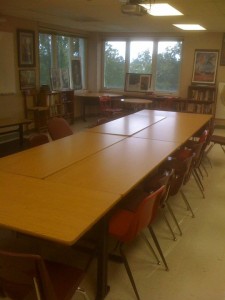 I don’t mind admitting that I enjoy reading David McCullough’s books. I’ve read most of them, though the quality of each book clearly fluctuates. I thought John Adams was brilliant as it combined an analytical flair with a wonderful narrative; on the other hand, 1776 was a disappointment. McCullough plays an important role in his ability to sell and captivate Americans with their own history, a difficult task to say the least. That said, I am troubled by McCullough’s recent forays into advising high school teachers, not because I believe that he doesn’t have anything to say, but because much of the attraction appears to be based on his literary stardom.
I don’t mind admitting that I enjoy reading David McCullough’s books. I’ve read most of them, though the quality of each book clearly fluctuates. I thought John Adams was brilliant as it combined an analytical flair with a wonderful narrative; on the other hand, 1776 was a disappointment. McCullough plays an important role in his ability to sell and captivate Americans with their own history, a difficult task to say the least. That said, I am troubled by McCullough’s recent forays into advising high school teachers, not because I believe that he doesn’t have anything to say, but because much of the attraction appears to be based on his literary stardom.Rockland, Maine’s Village Soup recently reported that David McCullough will join 15 high school teachers for a 2-week intensive seminar at the Gen. Henry Knox Museum. The title of the seminar is, “From Frontier to Republic: Teaching Maine History.”
“We have to revise how we teach our teachers,” McCullough has said again and again. Author of the bestsellers “John Adams” and “1776” (in which Henry Knox is a major player), McCullough has long been involved in national efforts to improve the teaching of history—he was the keynote speaker at the 2005 annual conference of the National Council for History Education, for instance–and said he welcomes the opportunity to assist with the local effort.
“I want to talk to teachers in general about the pull, the appeal of history. In my view, knowledge of history is essential to being a good citizen. It’s who we are. It’s also a huge source of pleasure, as art and music are. It’s not a pill that we have to take,” he said
McCullough said he has a particular interest in fostering history education among elementary school students. “Their little minds are like sponges. They can learn anything fast, and they want to learn,” he said. He emphasized how history is filled with stories and how children love stories. “Tell stories,” he said, crediting the late historian Barbara Tuchman with that simple teaching advice. “I know it works,” he said.
Now I don’t necessarily disagree with anything McCullough says here, but is any of this new or even psychologically interesting? More important, does this in any way address the serious problems with our public school system? On a more local level, does it even begin to address the historical illiteracy that plagues our society? What troubles me is that these comments smack of someone who is sincere, but does not really have any firm understanding of the classroom or pedagogy. I’ve been to a few seminars with academic and/or popular historians. I always enjoy my time and I learn a great deal, but rarely learn anything that has direct application to the classroom. And that of course is due to the fact that many of these people have absolutely no experience in the classroom. Who can disagree with McCullough’s statement that “Their little minds are like sponges,” but this is neither interesting nor is it helpful. Let’s get over the rockstar obsession and get down to some serious thinking about how to engage students through history.